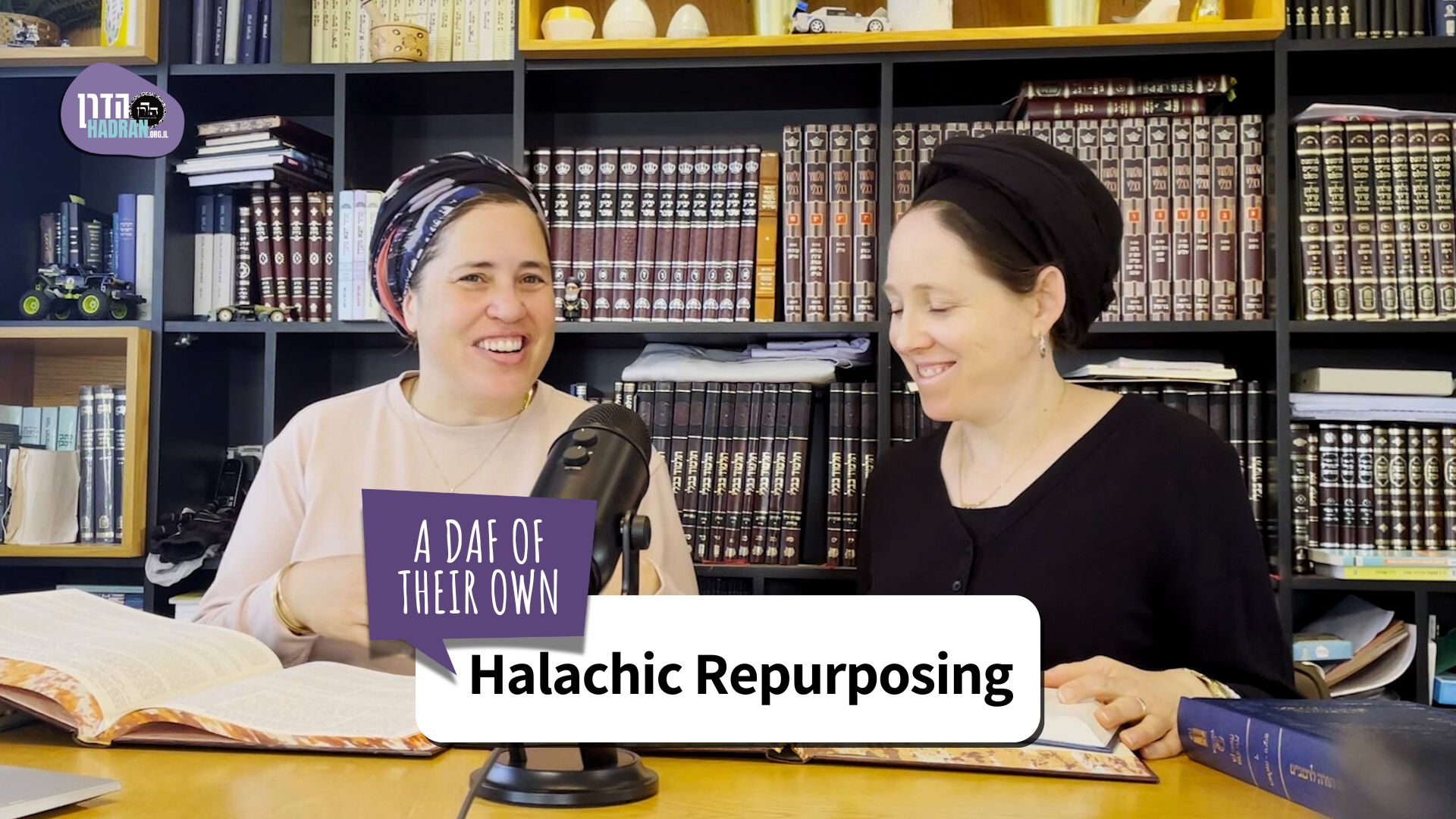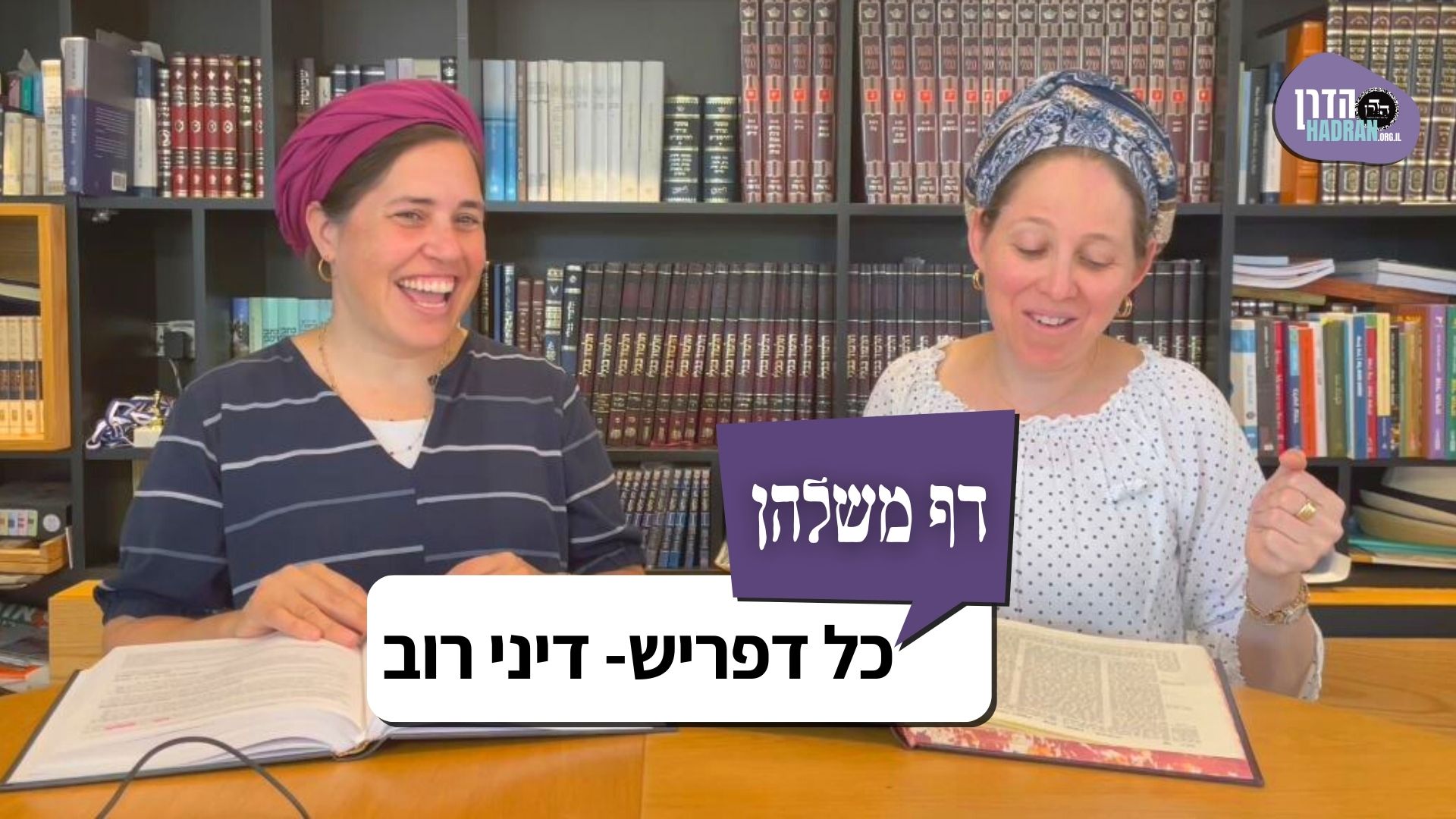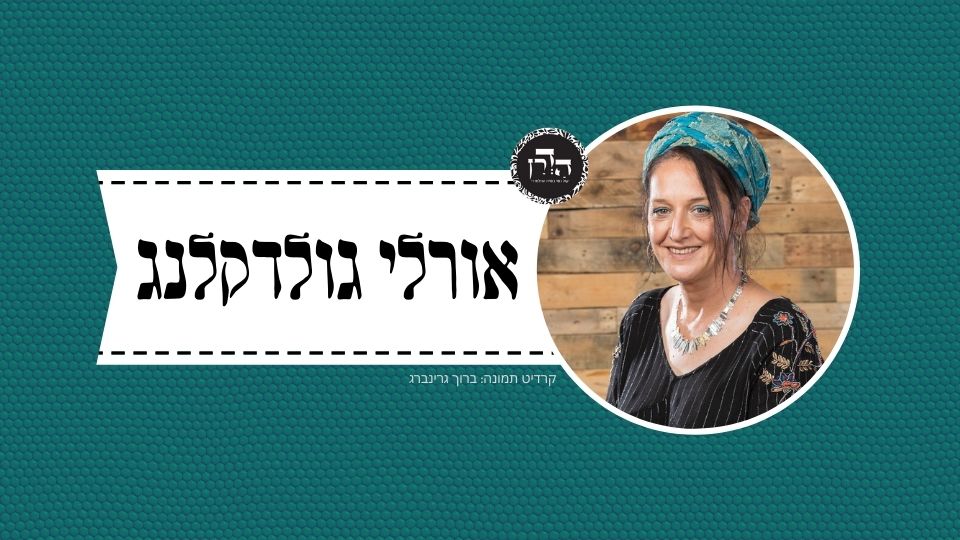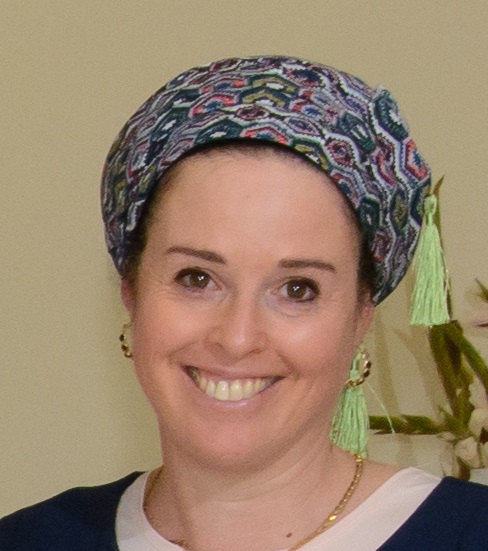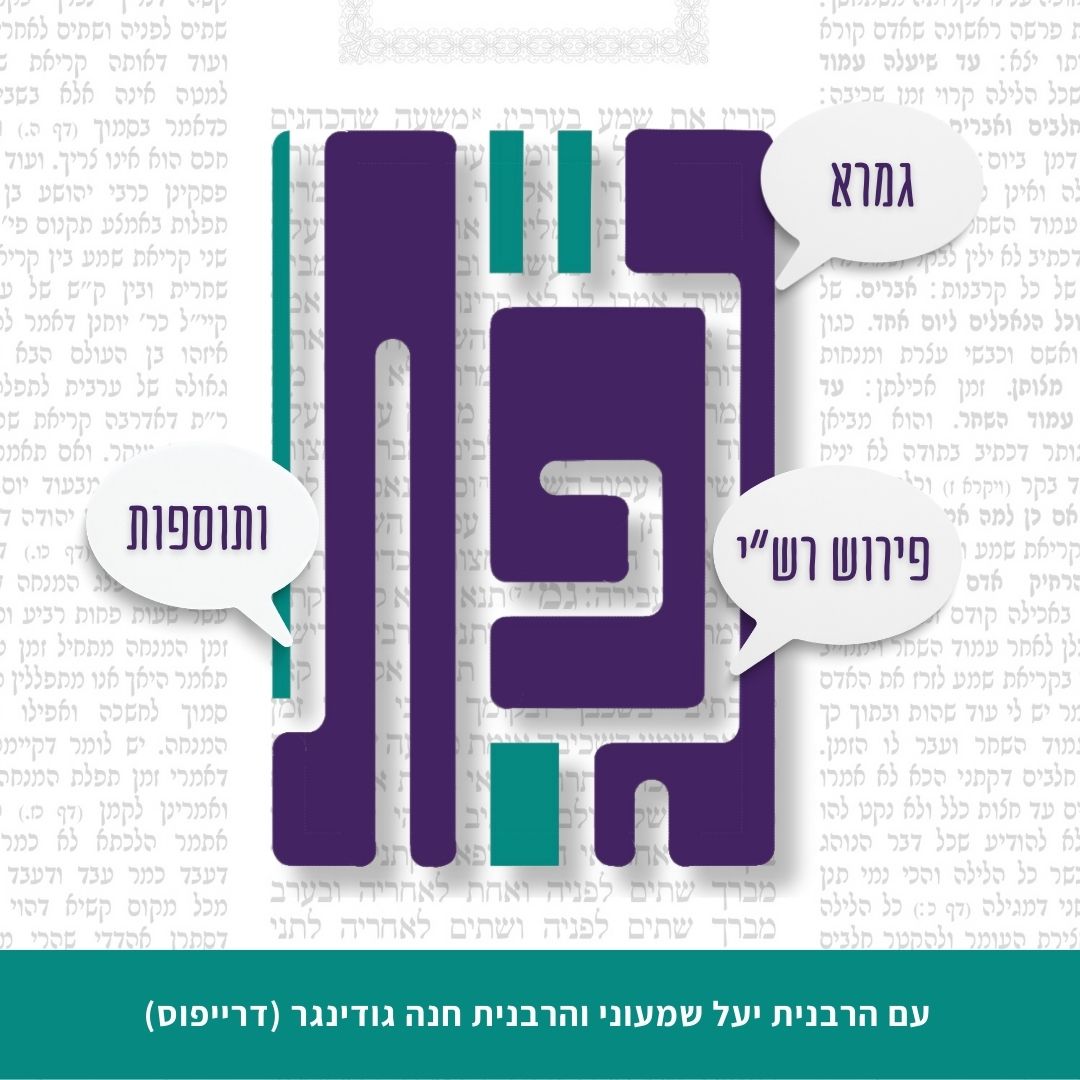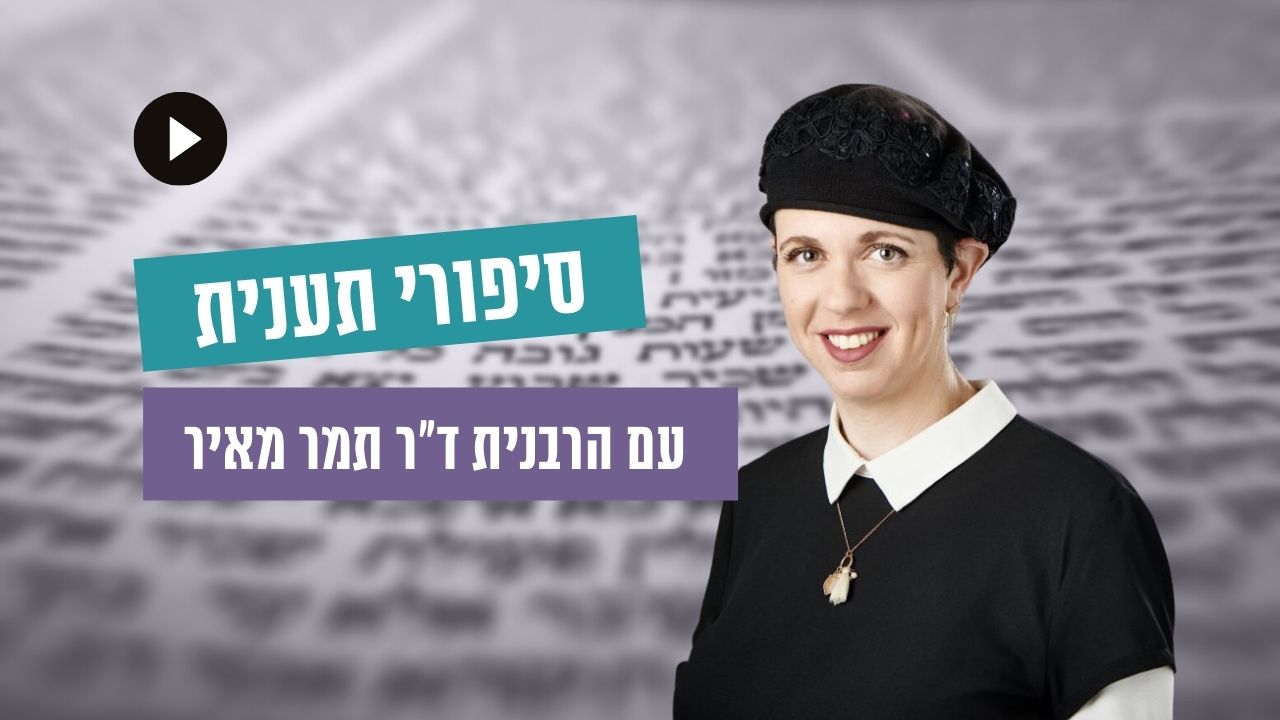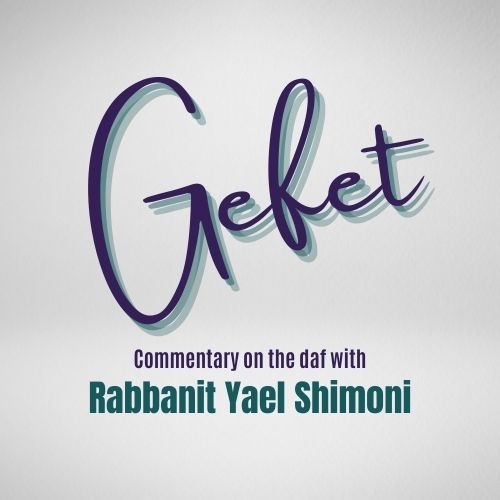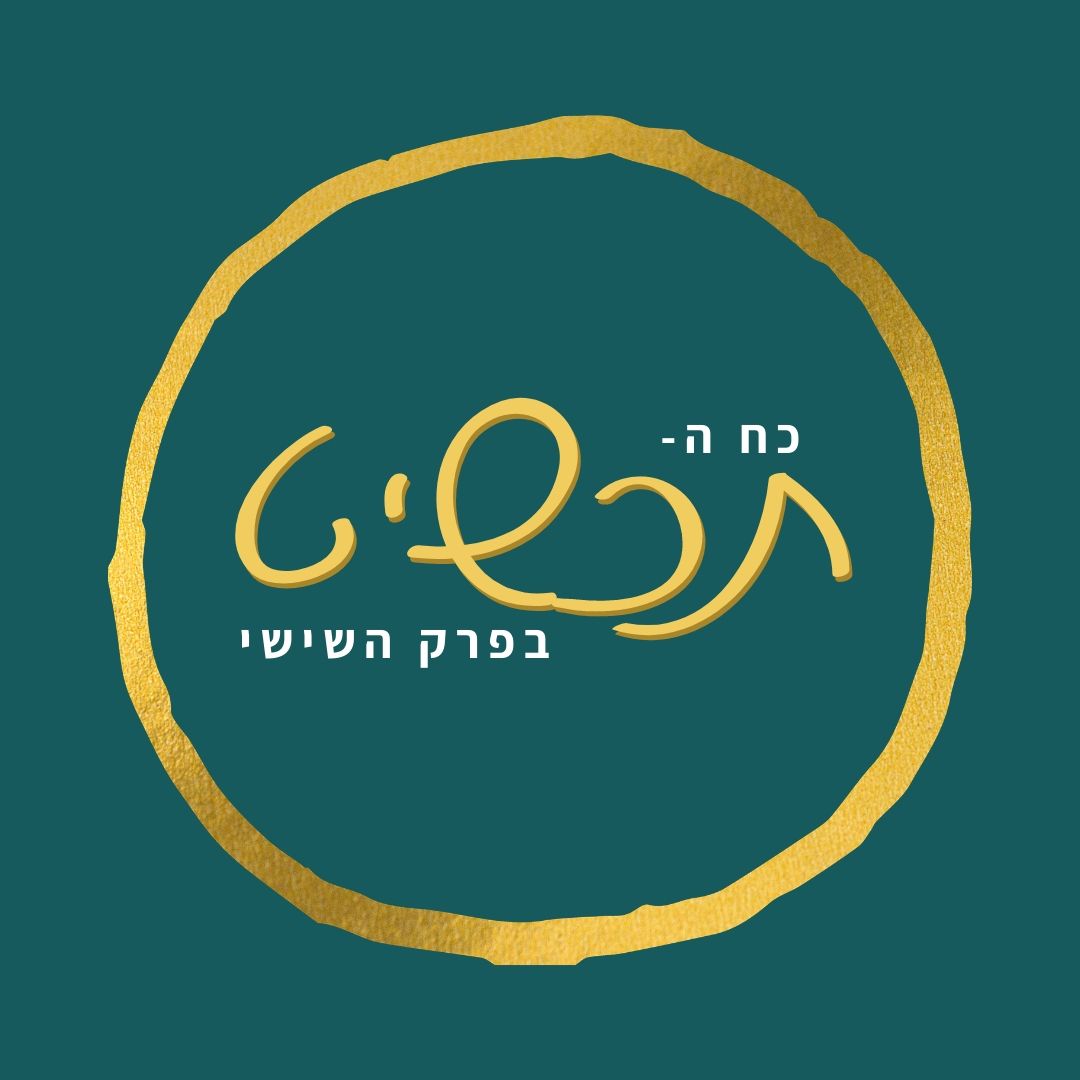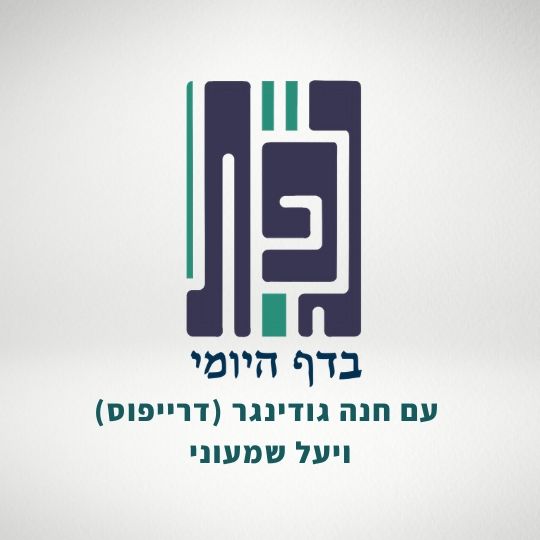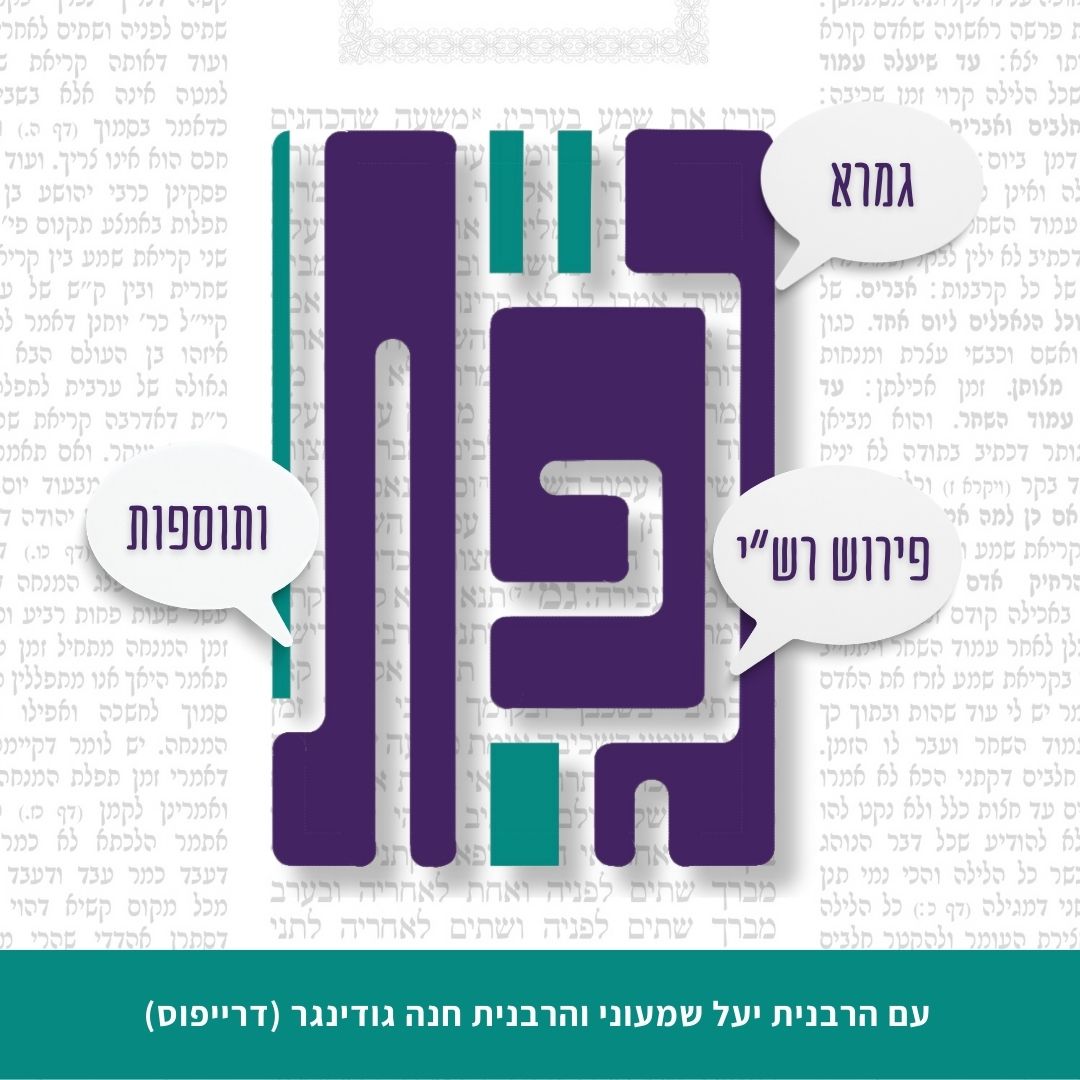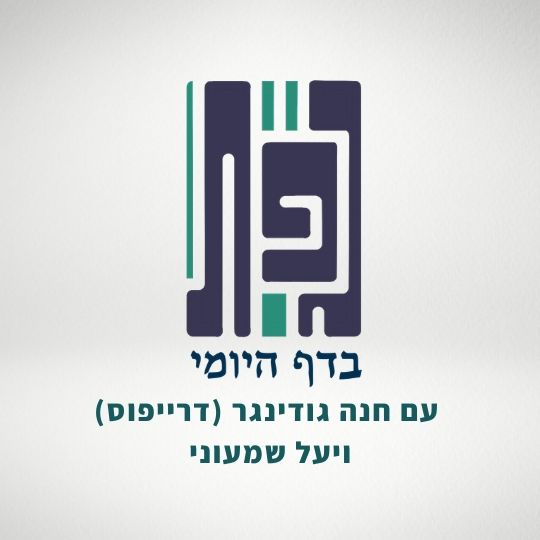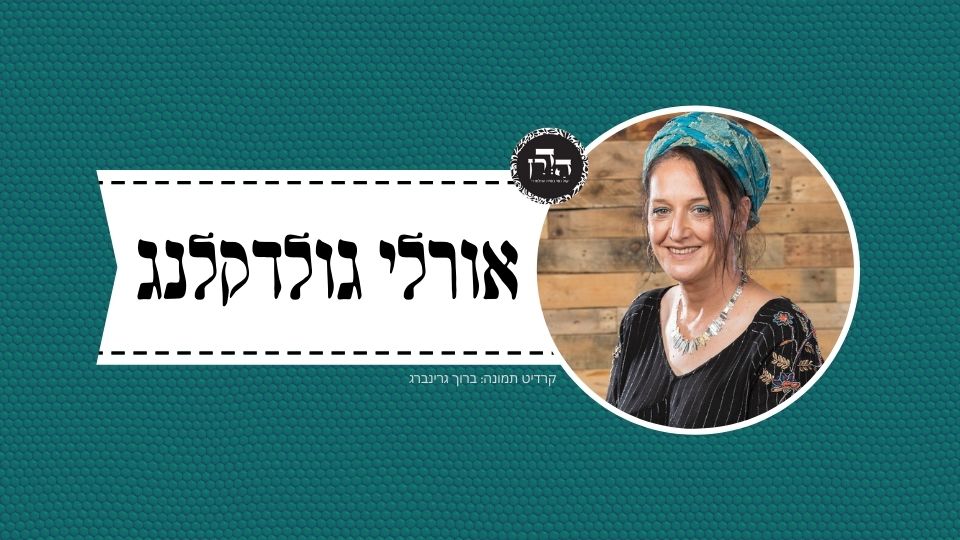הגמרא מביאה כמה קושיות ממקרים שבהם יש קרבן שמביאים משום ספק ובכל אופן מביאים את הקרבן אפילו לאחר שעבר יום הכיפורים. מניין לנו שלאחר יום הכיפורים אם נודע שהוא חטא בוודאות, הכפרה של יום הכיפורים לא כיפר על זה? כנ”ל לגבי אשם תלוי. המקרה במשנה שהביא חטאת עוף מספק לידה והתברר הספק, יקבר – מה התברר? שילדה ודאי או לא ילדה ודאי? ולמה תקבר?
רוצה להקדיש שיעור?
כלים
העמקה
רוצה להבין מה באמת קורה מתחת לפני השטח של הסוגיה?
שיעורים, פודקאסטים והרחבות של מיטב המורות שלנו יפתחו לך עוד זוויות וכיווני חשיבה.
חדשה בלימוד הגמרא?
זה הדף הראשון שלך? איזו התרגשות עצומה! יש לנו בדיוק את התכנים והכלים שיעזרו לך לעשות את הצעדים הראשונים ללמידה בקצב וברמה שלך, כך תוכלי להרגיש בנוח גם בתוך הסוגיות המורכבות ומאתגרות.
פסיפס הלומדות שלנו
גלי את קהילת הלומדות שלנו, מגוון נשים, רקעים וסיפורים. כולן חלק מתנועה ומסע מרגש ועוצמתי.
כריתות כו
לְמִפְשְׁטַיהּ לָא מִדְּרַב דִּימִי וְלָא מִדְּאַבַּיֵּי,
and find a way to explain that halakha, neither from that statement of Rav Dimi, who derived it from the verse: “And from their transgressions, for all their sins” (Leviticus 16:16), nor from that statement of Abaye, who derived it from the verse: “For all their transgressions, for all their sins” (Leviticus 16:21).
אֶלָּא מֵהָא: חֵטְא שֶׁאֵין מַכִּיר בּוֹ אֶלָּא הַמָּקוֹם – יוֹם הַכִּפּוּרִים מְכַפֵּר, וּמִינַּהּ: חֵטְא שֶׁאֵין מַכִּיר בּוֹ אֶלָּא הַמָּקוֹם הוּא דְּיוֹם הַכִּפּוּרִים מְכַפֵּר, אֲבָל דְּיָדַע בֵּהּ – לָא מְכַפַּר.
Rather, it is derived from that which Rabbi Elazar said: With regard to Yom Kippur the verse states: “From all your sins before the Lord” (Leviticus 16:30). This indicates that Yom Kippur atones for a sin of which only the Omnipresent is aware, i.e., an uncertain sin for which one brings a provisional guilt offering. And from that statement it is derived that it is only for a sin of which only the Omnipresent is aware that Yom Kippur atones, but it does not atone for a sin about which the sinner is aware.
וְאָמַר רַב תַּחְלִיפָא אֲבוּהּ דְּרַב הוּנָא מִשְּׁמֵיהּ דְּרָבָא: חַיָּיבֵי מַלְקִיּוֹת שֶׁעָבַר עֲלֵיהֶן יוֹם הַכִּפּוּרִים – חַיָּיב. פְּשִׁיטָא! מַאי שְׁנָא מֵחַיָּיבֵי חַטָּאוֹת וַאֲשָׁמוֹת וַדָּאִין?
And Rav Taḥlifa, father of Rav Huna, further says in the name of Rava: Those liable to receive lashes for whom Yom Kippur has passed are liable to receive those lashes after Yom Kippur. The Gemara asks: Isn’t that obvious? What is the difference between this case and the case of those liable to bring sin offerings and definite guilt offerings, who must bring them after Yom Kippur?
סָלְקָא דַעְתָּךְ אָמֵינָא: הָתָם – מָמוֹנָא הוּא, אֲבָל הָכָא דְּגוּפָא הוּא – אֵימָא לָא, קָא מַשְׁמַע לַן.
The Gemara answers: It might enter your mind to say: There, where the liability to bring sin offerings and definite guilt offerings is financial in nature, Yom Kippur does not exempt one from financial obligations. But here, where the liability to incur lashes applies to one’s body, one might say that he is not flogged after Yom Kippur. Therefore, Rav Taḥlifa teaches us that this is not so.
וְהָא אֲנַן תְּנַן: הוֹדַע וְלֹא הוֹדַע, עֲשֵׂה וְלֹא תַעֲשֶׂה!
The Gemara asks: How can Rava say that Yom Kippur does not exempt one from the liability to incur lashes? But didn’t we learn in a mishna (Shevuot 2b): For other prohibitions that are stated in the Torah, apart from those delineated in that mishna, whether one became aware of them before Yom Kippur or did not become aware of them until after Yom Kippur, whether they are positive mitzvot or prohibitions, Yom Kippur atones for them. This is the halakha despite the fact that one who transgresses a prohibition is liable to incur lashes.
לָא קַשְׁיָא: הָא – דְּאַתְרוֹ בֵּיהּ, הָא – דְּלָא אַתְרוֹ בֵּיהּ.
The Gemara answers: That is not difficult. This statement of Rava is referring to a transgression about which witnesses warned him, and therefore he is liable to incur lashes, and Yom Kippur does not completely atone for him. That mishna is referring to a transgression about which they did not warn him, and he is not liable to incur lashes, and therefore Yom Kippur provides full atonement.
אֶלָּא מֵעַתָּה (סִימָן יוֹלֶדֶת מְצוֹרָע נָזִיר סוֹטָה בְּעֶגְלָה),
The Gemara now analyzes the above statement: Those liable to bring provisional guilt offerings are exempt from bringing them after Yom Kippur because Yom Kippur atones for a sin of which only the Omnipresent is aware. Before beginning its discussion, which consists of a series of queries starting with the phrase: If that is so, the Gemara provides a mnemonic device for the topics it will address: A woman who gave birth; a leper; a nazirite; a sota; in a heifer.
סָפֵק יוֹלֶדֶת שֶׁעָבַר עָלֶיהָ יוֹם הַכִּפּוּרִים לָא תַּיְיתֵי, דְּהָא כַּפַּר עֲלֵיהּ יוֹם הַכִּפּוּרִים, דְּחֵטְא שֶׁאֵין מַכִּיר בּוֹ אֶלָּא הַמָּקוֹם הוּא! אָמַר רַב הוֹשַׁעְיָא: ״לְכׇל חַטֹּאתָם״ – וְלֹא לְכׇל טוּמְאֹתָם.
The Gemara raises a difficulty: If that is so, that Yom Kippur atones for a sin of which only the Omnipresent is aware, a woman who gave birth who is uncertain whether her miscarriage obligated her to bring a sin offering should not bring her sin offering after Yom Kippur has passed, due to the fact that Yom Kippur atoned for her. As this is a case of a sin of which only the Omnipresent is aware, since God alone knows the nature of her miscarriage. Rav Hoshaya said: With regard to Yom Kippur the verse states: “For all their sins” (Leviticus 16:21), indicating that Yom Kippur atones for all their sins but not for all their impurity. A woman who gives birth does not bring a sin offering for atonement, but rather in order to purify her and thereby enable her to consume sacrificial meat.
וּלְרַבִּי שִׁמְעוֹן בֶּן יוֹחַי, דְּאָמַר יוֹלֶדֶת חוֹטֵאת הִיא, מַאי אִיכָּא לְמֵימַר? יוֹלֶדֶת כִּי קָא מַיְיתֵי קׇרְבָּן – לְאִישְׁתְּרוֹיֵי בַּאֲכִילַת קָדָשִׁים הוּא, וְלָא לְכַפָּרָה מֵתְיָא.
The Gemara asks: But according to the opinion of Rabbi Shimon ben Yoḥai, who says: A woman who gave birth is a sinner, what is there to say? The Gemara answers: Even according to the opinion of Rabbi Shimon, when a woman who gave birth brings an offering, she brings it in order to permit her to eat sacrificial food, which is the final stage in her process of purification; but she does not bring the offering for atonement. Therefore, she must bring her offering after Yom Kippur, as Yom Kippur effects atonement but not purification.
אָמַר רַב אָשֵׁי, אַף אֲנַן נָמֵי תְּנֵינָא: הָאִשָּׁה שֶׁיֵּשׁ עָלֶיהָ חַטַּאת הָעוֹף סָפֵק, וְעָבַר עָלֶיהָ יוֹם הַכִּפּוּרִים – חַיֶּיבֶת לְהָבִיא לְאַחַר יוֹם הַכִּפּוּרִים, מִפְּנֵי שֶׁמַכְשַׁרְתָּהּ לֶאֱכוֹל בִּזְבָחִים.
Rav Ashi said that we learn in the mishna (25a) as well: A woman upon whom it is incumbent to bring a bird sin offering due to uncertainty, e.g., uncertainty as to whether her miscarriage obligated her to bring the sin offering of a woman who gave birth, for whom Yom Kippur has passed, is liable to bring it after Yom Kippur. This is because the offering does not come as atonement for a sin. Rather, it renders her eligible to partake of the meat of offerings.
אֶלָּא מֵעַתָּה, סְפֵק מְצוֹרָע שֶׁעָבַר יוֹם הַכִּפּוּרִים לָא מַיְיתֵי, דְּהָא עֲבַר עֲלֵיהּ יוֹם הַכִּפּוּרִים, דְּחֵטְא שֶׁאֵין מַכִּיר בּוֹ אֶלָּא הַמָּקוֹם הוּא! אָמַר רַבִּי אוֹשַׁעְיָא: ״לְכׇל חַטֹּאתָם״ – וְלֹא לְכׇל טוּמְאֹתָם.
The Gemara objects: If that is so, then an uncertain leper who is obligated to bring an offering for purification for whom Yom Kippur has passed should not bring his offering, due to the fact that Yom Kippur has passed for him, as this is a case of a sin of which only the Omnipresent is aware, since God knows if he is impure. Rabbi Oshaya said that the verse states: “For all their sins” (Leviticus 16:21), but not for all their impurity, and this offering is also brought for purification.
וְהָא אָמַר רַבִּי שְׁמוּאֵל בַּר נַחְמָנִי אָמַר רַבִּי יוֹחָנָן: עַל שִׁבְעָה דְּבָרִים נְגָעִים בָּאִים! (סִימָן גג״ג ששל״ץ) מְצוֹרָע כִּי מַיְיתֵי לָאו לְכַפָּרָה מַיְיתֵי, אֶלָּא לְאִישְׁתְּרוֹיֵי בַּאֲכִילַת קָדָשִׁים הוּא.
The Gemara objects: But doesn’t Rabbi Shmuel bar Naḥmani say that Rabbi Yoḥanan says: Leprous marks come due to seven matters, i.e., there are seven sins that are the possible causes of leprosy. The Gemara cites a mnemonic for these seven sins: Gimmel, gimmel, gimmel, shin, shin, lamed, tzadi. This stands for gilui arayot, forbidden sexual intercourse; gasut haruaḥ, arrogance; gezel, robbery; shefikhut dammim, bloodshed; shevuat shav, an oath taken in vain; lashon hara, slander; and tzarut ha’ayin, stinginess (see Arakhin 16a). Since leprosy develops because of some sin, this means that the leper’s offerings are also brought because of sin. The Gemara explains: Even so, when a leper brings an offering, he does not bring the offering for atonement. Rather, it is brought in order to permit him to eat sacrificial food. Therefore, he must bring his offering after Yom Kippur.
אֶלָּא מֵעַתָּה, סְפֵק נָזִיר שֶׁעָבַר עָלָיו יוֹם הַכִּפּוּרִים לָא מַיְיתֵי קׇרְבָּן, דְּהָא כַּפַּר יוֹם הַכִּפּוּרִים, דְּחֵטְא שֶׁאֵין מַכִּיר בּוֹ אֶלָּא הַמָּקוֹם הוּא! אָמַר רַבִּי אוֹשַׁעְיָא: לְכׇל חַטָּאת״ – וְלֹא לְכׇל טוּמְאָה.
The Gemara objects: If that is so, that Yom Kippur atones for a sin of which only the Omnipresent is aware, then in a case of an uncertain nazirite, i.e., when it is uncertain if the nazirite became impure through contact with the dead, which would obligate him to bring an offering for purification, for whom Yom Kippur has passed, he should not bring an offering, due to the fact that Yom Kippur atoned for him, as this too is a sin of which only the Omnipresent is aware. Once again, Rabbi Oshaya said that the verse states that Yom Kippur atones “for all their sins,” but not for all their impurity.
וּלְרַבִּי אֶלְעָזָר בֶּן הַקַּפָּר, דְּאָמַר: נָזִיר חוֹטֵא הוּא, מַאי אִיכָּא לְמֵימַר? נָזִיר כִּי קָא מַיְיתֵי קׇרְבָּן, לָאו לְכַפָּרָה מַיְיתֵי, לְאִשְׁתְּרוֹיֵי בַּאֲכִילַת קָדָשִׁים הוּא.
The Gemara asks: But according to the opinion of Rabbi Elazar ben HaKappar, who says: A nazirite is a sinner, as he has caused himself to suffer by abstaining from wine, what is there to say? The Gemara answers similarly: Even so, when a nazirite brings an offering, he does not bring the offering for atonement. Rather, he brings it in order to permit him to eat sacrificial food. Consequently, he must bring his offering after Yom Kippur.
אֶלָּא מֵעַתָּה, סְפֵק סוֹטָה, שֶׁעָבַר עָלֶיהָ יוֹם הַכִּפּוּרִים לָא תַּיְיתֵי, דְּהָא כַּפַּר עֲלַהּ יוֹם הַכִּפּוּרִים, דְּחֵטְא שֶׁאֵינוֹ מַכִּיר בּוֹ אֶלָּא הַמָּקוֹם! אָמַר רַבִּי הוֹשַׁעְיָא: ״לְכׇל חַטֹּאתָם״ – וְלֹא לְכׇל טוּמְאֹתָם.
The Gemara continues to object: If that is so, an uncertain sota, i.e., a woman suspected by her husband of having been unfaithful who then secludes herself with another man, for whom Yom Kippur has passed, should not bring an offering, due to the fact that Yom Kippur has atoned for her, as this is a sin of which only the Omnipresent is aware. Rabbi Oshaya said that the verse states: “For all their sins,” but not for all their impurity, and the actions of a sota are referred to as rendering her impure (see Numbers 5:13).
אָמַר אַבָּיֵי: בּוֹעֵל מַכִּיר בּוֹ. רָבָא אָמַר: סוֹטָה כִּי מֵתְיָיא – לְבָרֵר עָוֹן (קָא אָתְיָא).
Abaye said a different answer: This is not a case of a sin of which only the Omnipresent is aware, because the paramour, i.e., the man suspected of having had intercourse with her, knows about her sin. Rava said that the case of a sota is not difficult: When a sota brings an offering, she brings it in order to clarify the existence of iniquity, but not for atonement.
אֶלָּא מֵעַתָּה, עֶגְלָה עֲרוּפָה שֶׁעָבַר עָלֶיהָ יוֹם הַכִּפּוּרִים! וְכוּ׳ אָמַר אַבָּיֵי: הוֹרֵג מַכִּיר. רָבָא אָמַר: אָמַר קְרָא: ״וְלָאָרֶץ לֹא יְכוּפַּר לַדָּם אֲשֶׁר שֻׁפַּךְ בָּהּ וְגוֹ׳״.
The Gemara raises another difficulty in the same format as above: If that is so, in the case of a heifer whose neck is broken, with regard to which Yom Kippur has passed, the heifer should not be brought, as this is a sin of which only the Omnipresent is aware, since the identity of the murderer is unknown. Abaye said: The murderer himself knows that he is the guilty party. Rava said that the verse states: “And no atonement can be made for the land for the blood that is shed therein, but by the blood of him who shed it” (Numbers 35:33).This indicates that atonement for murder can be achieved only by means of the heifer whose neck is broken or capital punishment for the murderer, not by Yom Kippur.
רַב פָּפָּא אָמַר: אָמַר קְרָא: ״כַּפֵּר לְעַמְּךָ יִשְׂרָאֵל וְגוֹ׳״ – רְאוּיָה כַּפָּרָה זוֹ שֶׁתְּכַפֵּר עַל יוֹצְאֵי מִצְרַיִם.
Rav Pappa said another answer: The verse states that the priests at the ceremony of the heifer whose neck is broken should recite the following sentence: “Forgive, Lord, Your people Israel, whom You have redeemed” (Deuteronomy 21:8). The verse indicates that this atonement, which is achieved through the heifer whose neck is broken, is also fit to atone retroactively for those who left Egypt, i.e., every case of unknown murder that occurred since the Jews left Egypt. It can be inferred from here that Yom Kippur of previous years have not atoned for those past murders.
הַשְׁתָּא דְּאָמְרַתְּ: חֵטְא שֶׁאֵין מַכִּיר בּוֹ אֶלָּא הַמָּקוֹם יוֹם הַכִּפּוּרִים מְכַפֵּר, אֵימָא: כִּי מִתְיְידַע לֵיהּ בָּתַר יוֹם הַכִּפּוּרִים נָמֵי לָא מַיְיתֵי חַטָּאת! אָמַר רַבִּי זְעֵירָא: לָא מָצֵית אָמְרַתְּ, דִּכְתִיב קְרָא יְדִיעָה גַּבֵּי חַטָּאת, וְגַבֵּי נְשִׂיא, וְגַבֵּי צִבּוּר.
§ The Gemara raises a difficulty: Now that you said that Yom Kippur atones for a sin of which only the Omnipresent is aware, one can say that when his sin becomes known to him after Yom Kippur as well, he should not bring a sin offering. Rabbi Zeira said that you cannot say this, as a term of knowing is written in a verse three times (see Leviticus 4:14, 23, 28): With regard to an individual’s sin offering and with regard to the sin offering of a Nasi, and with regard to a communal sin offering. Since it was not necessary to repeat an expression of knowing in all three instances, this teaches that anyone who knows about his sin must bring a sin offering, even if he became aware after Yom Kippur.
צְרִיכִי, דְּאִי כְּתַב קְרָא גַּבֵּי יָחִיד, הֲוָה אָמֵינָא: כּוּלְּהוֹן מִיָּחִיד לָא אָתְאָן, דְּאִיכָּא לְמִיפְרַךְ: מָה לְיָחִיד, שֶׁכׇּל קׇרְבָּנוֹ נְקֵבָה.
The Gemara rejects this derivation: All three instances of a term of knowing are necessary to teach that each sin offering is brought only for a known sin and not for an uncertain sin, and therefore no instance of the term is superfluous. The Gemara elaborates: As, if the verse had stated a term of knowing with regard to the sin offering of an individual, I would say that the halakhot of all sin offerings, i.e., of a Nasi and the community, cannot be derived from the sin offering of an individual, as this suggestion can be refuted: What is unique about the sin offering of an individual? It is unique in that all of his sin offerings are female, either a ewe or a female goat, whereas a Nasi brings a male goat, and the sin offering of the community is a bull.
נִכְתּוֹב גַּבֵּי נָשִׂיא, וְנַיְיתֵי הָנָךְ מִנָּשִׂיא!
The Gemara continues: And if you would say: Let the verse write a term of knowing with regard to the sin offering of a Nasi, and let these, the sin offerings of an individual and the community, be derived from that of a Nasi, this derivation can likewise be rejected.
יָחִיד מִנָּשִׂיא לָא אָתֵי, דְּאִיכָּא לְמִיפְרַךְ: מָה לְנָשִׂיא, שֶׁכֵּן אֵין בִּשְׁמִיעַת קוֹל, תֹּאמַר בְּיָחִיד שֶׁכֵּן יֶשְׁנוֹ בִּשְׁמִיעַת קוֹל!
The Gemara elaborates: The sin offering of an individual cannot be derived from that of a Nasi, as this suggestion can be refuted: What is unique about the sin offering of a Nasi? It is unique and more lenient than the sin offering of an individual in that a Nasi, i.e., a king, is not included in the obligation of a sin offering for hearing a voice, i.e., taking a false oath that one did not witness an event (see Leviticus 5:1), as a king may not testify. Can you say the same with regard to an individual, who is included in the obligation of a sin offering for hearing a voice?
וְצִבּוּר מִנָּשִׂיא לָא אָתֵי, דְּאִיכָּא לְמִיפְרַךְ: מָה לְנָשִׂיא, שֶׁכֵּן בְּקׇרְבָּנוֹ נְקֵבָה!
And furthermore, the halakha of a communal sin offering cannot be derived from that of a Nasi, as this suggestion can likewise be refuted: What is unique about the sin offering of a Nasi? It is unique in that there is in his types of offering a case of a female offering, for an unintentional sin of idol worship, whereas a communal sin offering is always male.
נִכְתּוֹב גַּבֵּי צִבּוּר, [וְנַיְיתֵי] יָחִיד וְנָשִׂיא מִינַּהּ! אִיכָּא לְמִיפְרַךְ: מָה לְצִבּוּר, שֶׁכֵּן אֵין חַיָּיבִין אֶלָּא עַל הֶעֱלֵם דָּבָר עִם שִׁגְגַת מַעֲשֶׂה.
The Gemara continues: And if you would say: Let the verse write a term of knowing with regard to the sin offering of the community, and let the sin offerings of an individual and a Nasi be derived from it, this derivation can likewise be refuted, as follows: What is unique about the sin offering of the community? It is unique and more lenient in that there is a sin offering only for an unwitting communal sin due to a mistaken ruling of the Sanhedrin accompanied by unwitting action of the community following their ruling, which is not the case with regard to the sin offerings of an individual and a Nasi.
מֵחֲדָא יְדִיעָה לָא אָתְיָא, תֵּיתֵי חֲדָא יְדִיעָה מִתַּרְתֵּי – לָא נִכְתּוֹב יְדִיעָה גַּבֵּי יָחִיד, וְתֵיתֵי מִנָּשִׂיא וְצִבּוּר.
The Gemara suggests: Granted that two instances of a term of knowing cannot be derived from one instance of a term of knowing. Nevertheless, let one instance of a term of knowing be derived from the other two, as follows: Let the Torah not write a term of knowing with regard to the sin offering of an individual, and let it be derived from the sin offering of a Nasi and that of the community.
אִיכָּא לְמִיפְרַךְ: מָה לְנָשִׂיא וְצִבּוּר, שֶׁכֵּן אֵינָן בִּשְׁמִיעַת קוֹל, תֹּאמַר בְּיָחִיד שֶׁיֶּשְׁנוֹ בִּשְׁמִיעַת קוֹל!
The Gemara explains that this suggestion can be refuted: What is unique about the sin offerings of a Nasi and the community, in which both share a leniency? They are unique in that they are not included in the obligation of a sin offering for hearing a voice. Can you say the same with regard to an individual, who is included in the obligation of a sin offering for hearing a voice?
לָא נִכְתּוֹב קְרָא יְדִיעָה גַּבֵּי צִבּוּר, וְתֵיתֵי מִידִיעָה דְּיָחִיד וְנָשִׂיא. אִיכָּא לְמִיפְרַךְ: מָה לְיָחִיד וְנָשִׂיא שֶׁכֵּן יֵשׁ בְּקׇרְבָּ[נָ]ן נְקֵבָה, תֹּאמַר בְּצִבּוּר שֶׁאֵין בְּקׇרְבָּ[נָ]ן נְקֵבָה!
The Gemara further suggests: Let the verse not write a term of knowing with regard to the sin offering of the community, and let it be derived from the instances of a term of knowing that are written with regard to the sin offerings of an individual and a Nasi. The Gemara again explains that this suggestion can be refuted: What is unique about the sin offerings of an individual and a Nasi? They are unique in that there is a case of a female offering brought by them. Can you say the same with regard to the sin offering of the community, where there is no case of a female offering brought by a community?
לָא נִכְתּוֹב גַּבֵּי נָשִׂיא, וְתֵיתֵי מִידִיעָה דְּיָחִיד וְצִבּוּר. מַאי פָּרְכַתְּ? אִי מִשּׁוּם דְּאֵינָן בִּשְׁמִיעַת הַקּוֹל – יָחִיד יוֹכִיחַ, דְּאֵינוֹ בִּשְׁמִיעַת הַקּוֹל,
The Gemara continues to suggest: Let the Torah not write a term of knowing with regard to the sin offering of a Nasi, and let it be derived from the instances of a term of knowing that are written with regard to the sin offerings of an individual and the community. What can you say to refute this suggestion? If you refute this due to the fact that a communal sin offering is more lenient, as it is not included in the obligation of a sin offering for hearing a voice, the sin offering of an individual, which is included in the obligation of a sin offering for hearing a voice, proves that this is not the decisive consideration.
וְאִי מִשּׁוּם דְּיֵשׁ בְּכׇל קׇרְבָּנוֹ נְקֵבָה – צִבּוּר יוֹכִיחַ, דְּאֵין בְּקׇרְבָּנָן נְקֵבָה, עַד דְּאִית לְהוֹן יְדִיעָה לָא מִחַיַּיב, לְמָה לִי דִּכְתִיב יְדִיעָה גַּבֵּי נָשִׂיא?
And if you refute this suggestion due to the fact that an individual sin offering is more lenient because all his sin offerings are female, the sin offering of the community, where there is no case of a female offering, proves that this is not the key factor. Since for both of these categories of sin offering there is no obligation to bring a sin offering until there is knowledge of the sin, why do I need a term of knowing that is written with regard to the sin offering of a Nasi?
אִם אֵינוֹ עִנְיָן לְגוּפֵיהּ, דְּהָא אָתְיָא מִיָּחִיד וְצִבּוּר, תְּנֵהוּ עִנְיָן לְהֵיכָא דְּמִתְיְידַע לֵיהּ בָּתַר יוֹם הַכִּפּוּרִים, דְּמַיְיתֵי חַטָּאת.
The Gemara concludes: If this term of knowing is not necessary for the matter of the sin offering of a Nasi itself, as it is already derived from the cases of an individual and the community, apply it to the matter of a case where his sin becomes known to him only after Yom Kippur, i.e., that in such an instance he brings a sin offering.
אַבָּיֵי אָמַר: אִי דְּלָא כְּתִיב יְדִיעָה גַּבֵּי נָשִׂיא, מִיָּחִיד וְצִבּוּר לָא אָתֵי, מִשּׁוּם דְּאִיכָּא לְמִיפְרַךְ: מָה לְיָחִיד וְצִבּוּר שֶׁכֵּן אֵין עֲשׂוּיִין לְהִשְׁתַּנּוֹת, תֹּאמַר
Abaye said: If the Torah had not stated a term of knowing with regard to a Nasi, it could not have been derived from the cases of an individual and the community, because this suggestion can be refuted: What is unique about the sin offerings of an individual and the community? They are unique in that both are set offerings that are not apt to change. Can you say
בְּנָשִׂיא שֶׁעָשׂוּי לְהִשְׁתַּנּוֹת!
the same with regard to a Nasi, whose offering is apt to change if he leaves his position, e.g., when he becomes impure as a leper (see Horayot 10a), as in such a case he brings the sin offering of an individual?
אֶלָּא אָמַר אַבָּיֵי, מֵהָכָא: מִכְּדֵי ״מִצְוֹת״ ״מִצְוֹת״ יָלְפִי מֵהֲדָדֵי,
Rather, Abaye said: The halakha that Yom Kippur does not atone for one who is liable to bring a sin offering can be derived from here: Since there is a verbal analogy between the word “mitzvot” mentioned with regard to the sin offerings of an individual and the word “mitzvot” mentioned with regard to a Nasi and with regard to the community, the halakhot of these three cases are derived from one another.
כֵּיוָן דְּיָלְפִי מֵהֲדָדֵי, לְמָה לִי דִּכְתִיב שָׁלֹשׁ יְדִיעוֹת גַּבֵּי יָחִיד וְגַבֵּי נָשִׂיא וְגַבֵּי צִבּוּר? אִם אֵינוֹ עִנְיָן לְגוּפֵיהֶן, דְּהָא גָּמְרִי לְהוֹן ״מִצְוֹת״ ״מִצְוֹת״, תְּנֵהוּ עִנְיָן הֵיכָא דְּמִתְיְידַע לֵיהּ בָּתַר יוֹם הַכִּיפּוּרִים הוּא דְּמַיְיתֵי חַטָּאת.
And since the halakhot of these cases are derived from one another, why do I need a term of knowing to be written three separate times, with regard to an individual, and with regard to a Nasi, and with regard to the community? If this term of knowing is not necessary for the matters of these sin offerings themselves, to teach that one brings a sin offering only for a known sin, as this is already derived from the verbal analogy of “mitzvot” and “mitzvot,” apply it to the matter of a case where his sin becomes known to him only after Yom Kippur. The halakha in that case would therefore be that he brings a sin offering.
אֵימָא כִּי מִתְיְידַע לֵיהּ בָּתַר יוֹם כִּפּוּרִים הוּא דְּמַיְיתֵי חַטָּאת, מִשּׁוּם דְּיוֹם הַכִּפּוּרִים לָאו עַל הָדֵין חֵטְא קָא אָתֵי, אֲבָל אָשָׁם תָּלוּי, דְּעַל הָדֵין חֵטְא קָאָתֵי, אֵימָא הָכִי נָמֵי דְּמִיכַּפַּר, דְּכִי מִתְיְידַע [לֵיהּ] לְבָתַר דְּקָא מַיְיתֵי אָשָׁם תָּלוּי לָא מַיְיתֵי חַטָּאת.
The Gemara raises a difficulty: But say that it is only when his sin becomes known to him after Yom Kippur that he brings a sin offering, because Yom Kippur did not come to atone for that specific sin. But with regard to a provisional guilt offering, which comes to atone for that specific sin, say indeed that he has achieved atonement. Therefore, if his sin becomes known to him after he brought a provisional guilt offering he should not bring a sin offering.
אָמַר רָבָא: אֲמַר קְרָא: ״אוֹ הוֹדַע אֵלָיו״ – מִכׇּל מָקוֹם. הַשְׁתָּא דְּאָמַר: כִּי מִתְיְידַע לֵיהּ מַיְיתֵי חַטָּאת, אָשָׁם תָּלוּי לָמָּה בָּא? אָמַר רַבִּי זֵירָא: שֶׁאִם מֵת, מֵת בְּלֹא עָוֹן. מַתְקֵיף לַהּ רָבָא: מֵת, מִיתָה מְמָרֶקֶת! אֶלָּא אָמַר רָבָא: לְהָגֵן עָלָיו מִן הַיִּיסּוּרִים.
Rava said in explanation that the verse states: “If his sin that he has sinned be known to him” (Leviticus 4:28), indicating that one is obligated to bring a sin offering in any case where his sin becomes known to him. The Gemara asks: Now that you say that when one’s sin becomes known to him he brings a sin offering, why does a provisional guilt offering come? Rabbi Zeira said: The reason is that if one dies before his sin becomes known to him, he dies without iniquity. Rava objects to this claim: If he dies, death itself absolves him, and therefore there is no need for a provisional guilt offering. Rather, Rava said: The reason that a provisional guilt offering is brought is in order to protect him from suffering until he brings his sin offering.
חַטַּאת הָעוֹף הַבָּא עַל הַסָּפֵק. אָמַר רַב: וְכִיפֵּר. אִי הָכִי, אַמַּאי תִּקָּבֵר?
§ The mishna teaches: With regard to a bird sin offering that is brought due to uncertainty, e.g., it is uncertain if she gave birth to a non-viable newborn, which results in an obligation to bring an offering, or if it was an amorphous mass, which does not, if it became known to her after the nape of the neck of the bird was pinched, the bird must be buried. It is assumed at this point that the phrase: It became known to her, is referring to a case where it became known to her that she certainly gave birth in a manner for which she is obligated to bring the sin offering of a woman after childbirth. In this context, Rav says: And the bird atoned for her after its blood was sprinkled and squeezed out on the wall of the altar. The Gemara asks: If so, that the bird atones, then it should be eaten by the priests, in accordance with the halakha of a bird sacrificed as a sin offering. Why, then, does the mishna state that it must be buried?
לְפִי שֶׁאֵינָהּ מִשְׁתַּמֶּרֶת. אֵימַת לֹא מִשְׁתַּמֶּרֶת? אִי מֵעִיקָּרָא – חַיָּה הָוְיָא! אִי לְבַסּוֹף – קָמְנַטַּר לַהּ!
The Gemara answers: Since a bird brought due to uncertainty is unfit to be eaten, the priest diverted his attention from the bird, and it was left unguarded. Therefore, there is a concern that the meat became impure. The Gemara asks: When was it left unguarded? If this means it was unguarded at the outset, before the pinching of the nape, the bird was still alive, and a living animal is not susceptible to ritual impurity. If this means later, after the pinching of the nape, the priest guards it at that stage.
אֶלָּא מַתְנִיתִין בְּנוֹדַע לָהּ דְּלֹא יָלְדָה, וּבְדִין הוּא דְּמוּתֶּרֶת בַּהֲנָאָה, וּמַאי ״תִּקָּבֵר״ – מִדְּרַבָּנַן.
Rather, the mishna is referring to a case where it became known to her that she did not give birth to a non-viable newborn and therefore she did not need to bring an offering.And by right it should have been permitted to derive benefit from the bird, as it is non-sacred. And if so, what is the reason for the mishna’s statement that it must be buried? This obligation applies by rabbinic law, to prevent people from mistakenly thinking that it is permitted to derive benefit from a bird brought as a sin offering due to uncertainty.
וְכִי אִיתְּמַר דְּרַב, עַל הָאִשָּׁה שֶׁהֵבִיאָה חַטַּאת הָעוֹף בְּסָפֵק, אִם עַד שֶׁלֹּא נִמְלְקָה נוֹדַע לָהּ שֶׁיָּלְדָה וַדַּאי – תַּעֲשֶׂה וַדַּאי, שֶׁמִּמִּין שֶׁהֵבִיאָה עַל לֹא הוֹדַע – מְבִיאָה עַל הוֹדַע.
And that statement of Rav, that she receives atonement, was stated with regard to the ruling of a previous mishna (22b): In the case of a woman who brought a bird sin offering in a situation of uncertainty as to whether her miscarriage obligated her to bring a sin offering, in which case the sin offering may not be eaten by priests, the halakha is as follows: If before the nape of the neck of the bird was pinched it became known to her that she certainly gave birth to a non-viable newborn, she should render the offering a definite sin offering, as from the same type of animal that she brings a sin offering in a case where it is unknown to her that she gave birth, she likewise brings a sin offering in a case where it is known to her.
אִם מִשֶּׁנִּמְלְקָה נוֹדַע שֶׁיָּלְדָה – אָמַר רַב: מַזֶּה דָּמָהּ וּמוֹצֶה דָּמָהּ, וְכִפְּרָה, [וּ]מוּתֶּרֶת בַּאֲכִילָה. רַבִּי יוֹחָנָן אָמַר: אֲסוּרָה בַּאֲכִילָה, גְּזֵירָה שֶׁמָּא יֹאמְרוּ: חַטַּאת הָעוֹף הַבָּאָה עַל הַסָּפֵק נֶאֱכֶלֶת.
If after the nape of the bird was pinched it became known to her that she certainly gave birth, in such a case Rav says: The priest sprinkles its blood and squeezes out its blood on the wall of the altar, and she has achieved atonement and fulfilled her obligation; and the bird is permitted in consumption by the priests. Rabbi Yoḥanan says: In such a case, even if the blood was sprinkled and squeezed out on the wall of the altar, the bird is prohibited in consumption, due to a rabbinic decree, lest people say: A bird that is brought as a sin offering due to uncertainty is consumed.
תָּנֵי לֵוִי כְּוָתֵיהּ דְּרַב: חַטַּאת הָעוֹף הַבָּאָה עַל הַסָּפֵק, אִם מִשֶּׁנִּמְלְקָה נוֹדַע שֶׁיָּלְדָה וַדַּאי – מַזֶּה דָּמָהּ וּמוֹצֶה דָּמָהּ, וְכִפְּרָה, [וּ]מוּתֶּרֶת בַּאֲכִילָה.
Levi teaches a baraita in accordance with the opinion of Rav: With regard to a bird sin offering that is brought due to uncertainty, if after the nape of the neck of the bird was pinched it became known that she certainly gave birth, the priest sprinkles its blood and squeezes out its blood, and she has achieved atonement; and the bird is permitted in consumption.
תַּנְיָא כְּווֹתֵיהּ דְּרַבִּי יוֹחָנָן: חַטַּאת הָעוֹף הַבָּאָה עַל הַסָּפֵק, אִם עַד שֶׁלֹּא נִמְלְקָה נוֹדַע לָהּ שֶׁלֹּא יָלְדָה – תֵּצֵא לְחוּלִּין, אוֹ תִּמָּכֵר לַחֲבֶרְתָּהּ. אִם עַד שֶׁלֹּא נִמְלְקָה נוֹדַע לָהּ שֶׁיָּלְדָה וַדַּאי – תַּעֲשֶׂה וַדַּאי, שֶׁמִּמִּין שֶׁמְּבִיאָה עַל לֹא הוֹדַע מְבִיאָה עַל הוֹדַע.
It is taught in a baraita in accordance with the opinion of Rabbi Yoḥanan: With regard to a bird sin offering that is brought due to uncertainty, if before the nape of the bird was pinched it became known to her that she did not give birth, the bird is transferred to non-sacred status or is sold to another woman who is obligated to bring a bird sin offering. If before the nape of the bird was pinched it became known to her that she certainly gave birth,she should render the offering a definite sin offering, as from the type of animal that she brings a sin offering in a case where it is unknown to her that she gave birth, she brings a sin offering in a case where it is known to her.
אִם מִשֶּׁנִּמְלְקָה נוֹדַע שֶׁיָּלְדָה – אֲסוּרָה אֲפִילּוּ בַּהֲנָאָה. שֶׁעַל הַסָּפֵק בָּאָה מִתְּחִלָּתָהּ, כִּפְּרָה סְפֵיקָהּ וְהָלְכָה לָהּ.
If after the nape of the bird was pinched it became known that she gave birth, the priest sprinkles its blood and squeezes out its blood, and she has received atonement; but consumption of the bird is prohibited. And if the blood was already squeezed out, then it is even prohibited to derive benefit from the bird, in accordance with the halakha of any bird brought as a sin offering due to uncertainty. The reason is that this sin offering was initially brought due to uncertainty; and it atoned for its uncertainty, and that uncertainty is gone.
מַתְנִי׳ הַמַּפְרִישׁ שְׁנֵי סְלָעִים לְאָשָׁם וְלָקַח בָּהֶן שְׁנֵי אֵילִים לְאָשָׁם, אִם הָיָה אֶחָד מֵהֶן יָפֶה שְׁתֵּי סְלָעִים – יִקְרַב לַאֲשָׁמוֹ, וְהַשֵּׁנִי יִרְעֶה עַד שֶׁיִּסְתָּאֵב וְיִמָּכֵר וְיִפְּלוּ דָּמָיו לִנְדָבָה.
MISHNA: With regard to one who designates two sela, which is the minimal value of a guilt offering,to purchase a ram for a guilt offering,and he purchased two rams for a guilt offering with the two sela, if one of them is now worth two sela, he shall sacrifice it for his guilt offering. And the second ram that he purchased with the money he designated does not become non-sacred. Rather, it shall graze until it becomes blemished; and then it shall be sold, and the money received for it shall be allocated for communal gift offerings.
לָקַח בָּהֶן שְׁנֵי אֵילִים לְחוּלִּין, אֶחָד יָפֶה שְׁתֵּי סְלָעִים וְאֶחָד יָפֶה עֲשָׂרָה זוּז – הַיָּפֶה שְׁתֵּי סְלָעִים יִקְרַב לַאֲשָׁמוֹ, וְהַשֵּׁנִי – לִמְעִילָתוֹ.
If he purchased two rams for non-sacred use with those two sela designated for a guilt offering, he has misused consecrated property. He is therefore liable to bring a guilt offering and to compensate the Temple treasury for those two sela and add one-fifth to the sum for a total of ten dinars, as there are four dinars in a sela. If one of the rams is now worth two sela, and the other one is now worth ten dinars, i.e., two and a half sela, the one that is worth two sela shall be sacrificed as his guilt offering for misuse of the two sela, and the second one shall be sacrificed for his initial misuse, as it is worth two sela plus one-fifth.
אֶחָד לְאָשָׁם וְאֶחָד לְחוּלִּין, אִם הָיָה שֶׁל אָשָׁם יָפֶה שְׁתֵּי סְלָעִים – יִקְרַב לַאֲשָׁמוֹ, וְהַשֵּׁנִי לִמְעִילָתוֹ, וְיָבִיא עִמָּהּ סֶלַע וְחוּמְשָׁהּ.
In a case where he purchased two rams with those two sela designated for a guilt offering, one for a guilt offering and one for non-sacred use, if the ram for the guilt offering is now worth two sela, it shall be sacrificed for his initial guilt offering. And with regard to the second ram that he purchased for non-sacred use, if it is now worth two sela, it shall be sacrificed as a guilt offering for his present misuse, and he brings with it the sum of one sela and one-fifth to the Temple treasury as payment for his misuse.
גְּמָ׳ מַאי ״מְעִילָתוֹ״ דְּקָתָנֵי רֵישָׁא, וְהַשֵּׁנִי לִמְעִילָתוֹ?
GEMARA: What is the term: His misuse, referring to, with regard to the halakha that is taught in the first clause of the mishna: If he purchased two rams for non-sacred use with those two sela designated for a guilt offering, if one of the rams is now worth two sela and the other one is worth ten dinars, the one that is worth two sela shall be sacrificed as his guilt offering and the second one shall be sacrificed for his misuse?
אִילֵּימָא אֵיל אָשָׁם, לְמֵימְרָא דְּחוֹמֶשׁ בַּהֲדֵי אַיִל מַיְיתֵי לֵיהּ? וְהָכְתִיב: ״וְאֵת אֲשֶׁר חָטָא מִן הַקֹּדֶשׁ יְשַׁלֵּם וְאֶת חֲמִישִׁיתוֹ יוֹסֵף עָלָיו״, אַלְמָא בַּהֲדֵי גְּזֵילוֹ מַיְיתֵי לֵיהּ!
If we say that the term: His misuse, is referring to the ram that one is obligated to bring as a guilt offering for misuse of consecrated property, is this to say that the additional one-fifth for misuse of consecrated property is brought together with the ram that he brings as a guilt offering for that sin? If so, then this would explain why if that ram offering is valued as more than two sela, the additional value fulfills the obligation of giving an additional one-fifth. But isn’t it written: “And he shall make restitution for that which he has done amiss with consecrated property, and he shall add to it one-fifth” (Leviticus 5:16)? The verse apparently indicates that he brings the additional one-fifth together with his repayment for that which he stole from consecrated property.
וְעוֹד, קָתָנֵי סֵיפָא: אֶחָד לְאָשָׁם וְאֶחָד לְחוּלִּין, אִם הָיָה שֶׁל אָשָׁם יָפֶה שְׁתֵּי סְלָעִים – יִקְרַב לַאֲשָׁמוֹ, וְהַשֵּׁנִי לִמְעִילָתוֹ, וְיָבִיא עִמָּהּ סֶלַע וְחוּמְשָׁהּ, אַלְמָא חוֹמֶשׁ בַּהֲדֵי גְּזֵילוֹ מַיְיתֵי לֵיהּ!
And furthermore, it is taught in the latter clause of the mishna: In a case where he purchased two rams with those two sela designated for a guilt offering, one for a guilt offering and one for non-sacred use, if the ram for the guilt offering is now worth two sela, it shall be sacrificed for his guilt offering. And with regard to the second ram that he purchased for non-sacred use, if it is now worth two sela, it shall be sacrificed for his misuse, and he brings with it payment of one sela and one-fifth to the Temple treasury as payment for his misuse. Evidently, he brings the one-fifth together with his repayment for that which he stole from consecrated property.
אֶלָּא, ״מְעִילָתוֹ״ – מַאי דְּאִיתְהֲנִי מֵהֶקְדֵּשׁ וְיֶשְׁנוֹ מִשְׁתֵּי סְלָעִים דְּאַפְרֵישִׁנּוּ[ן] לְאָשָׁם וְלָקַח בָּהֶן שְׁנֵי אֵילִים לְחוּלִּין, דְּיָפֶה שְׁתֵּי סְלָעִים מַקְרֵיב לֵיהּ אֵיל אָשָׁם, וְיָפֶה עֲשָׂרָה זוּז יָהֵיב לֵיהּ לְמַאי דְּאִיתְהֲנִי מֵהֶקְדֵּשׁ דְּהָוֵה לֵיהּ גְּזֵילוֹ, וְחוּמְשׁוֹ. וּמַאי ״מְעִילָתוֹ״? גְּזֵילוֹ.
Rather, when the mishna states: The ram worth ten dinars shall be sacrificed for his misuse, it means as repayment for that which he derived benefit from consecrated property. And those are the two sela that he initially designated for a guilt offering and with which he bought two rams as non-sacred animals. The Gemara explains: The reason for this is that the ram worth two sela he sacrifices for his ram of the guilt offering for his trespass, and the ram worth ten dinars he gives for that which he derived benefit from consecrated property, as he used two sela of consecrated property, which are for that which he stole, equal to eight dinars plus an additional one-fifth, the extra two dinars. And if so, to what is the term: His misuse, referring? It is not referring to the ram brought as a guilt offering for his misuse of consecrated property, but rather to the repayment for that which he stole from consecrated property.
בְּמַאי אוֹקֵימְתַּאּ לִ״מְעִילָתוֹ״ דְּרֵישָׁא – גְּזֵילוֹ. אֵימָא סֵיפָא: אֶחָד לְאָשָׁם וְאֶחָד לְחוּלִּין, אִם הָיָה שֶׁל אָשָׁם יָפֶה שְׁתֵּי סְלָעִים – יִקְרַב לַאֲשָׁמוֹ, וְהַשֵּׁנִי לִמְעִילָה וְיָבִיא עִמָּהּ, סֶלַע וְחוּמְשָׁהּ.
The Gemara asks: With reference to what case did you interpret the term: His misuse, in the first clause of the mishna? It was interpreted as referring to the repayment for that which he stole from consecrated property. If so, say the latter clause of the mishna: In a case where he purchased two rams with those two sela designated for a guilt offering, one for a guilt offering and one for non-sacred use, if the ram for the guilt offering is now worth two sela, it shall be sacrificed for his initial guilt offering. And with regard to the second ram that he purchased for non-sacred use, if it is now worth two sela, it shall be sacrificed for his misuse of consecrated property, and he brings with it payment of one sela and one-fifth to the Temple treasury as payment for his misuse.
אַלְמָא ״מְעִילָתוֹ״ – אֵיל אָשָׁם. רֵישָׁא קָרֵי לֵיהּ לִ״מְעִילָתוֹ״ גְּזֵילוֹ,
Since the mishna teaches that he gives one sela and one-fifth as repayment for that which he stole, evidently the term: His misuse, is referring to the ram that he brings as a guilt offering. The Gemara questions this inconsistency: The first clause uses the term: His misuse, in reference to the repayment for that which he stole,

